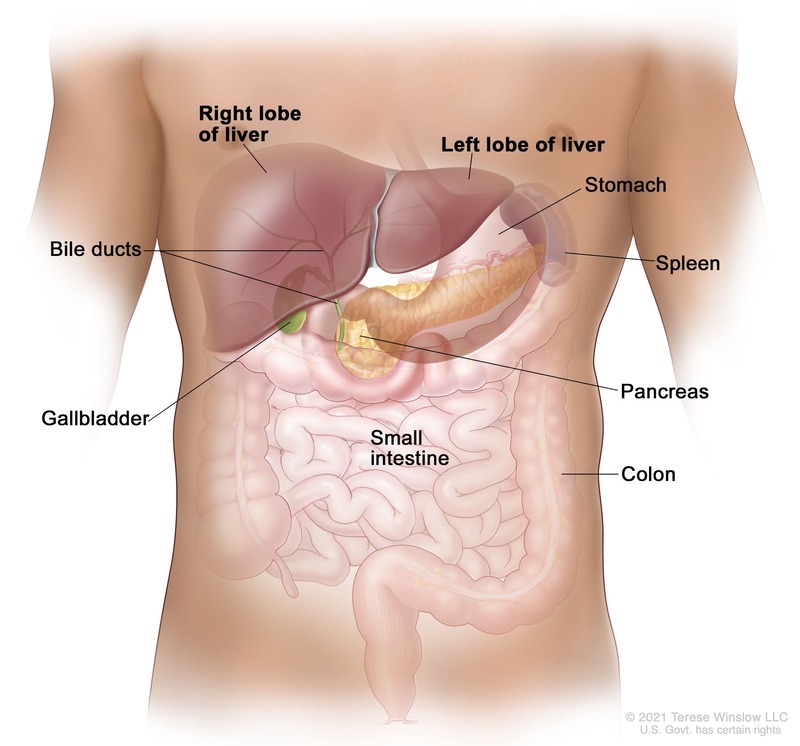Bile Duct Cancer is a rare form of cancer, in which cancer cells form in your bile ducts, a network of tubes that connect your liver, gallbladder, and small intestine. Bile Duct Cancer can present as Cholangiocarcinoma or Gallbladder Cancer.
Tap “Watch Now” for an easy-to-understand overview of Billiary Tract Metastatic Liver Cancer.- Billiary Tract Metastatic Liver Cancer
Overview
 Listen Now
Listen Now

Metastatic Bile Duct Cancer is when the cancer has spread outside of the ducts and may have spread to your liver or other parts of your abdominal cavity as shown here. The cancer may have also spread to distant organs of your body.
What Tests Will I Need and Why?
Blood and Imaging tests are done to understand your general health, confirm your diagnosis and determine your cancer stage.
Tissue analysis is also typically done to identify the cancer cell type, which is critical to finding the best treatment option for you.
If your treatment team has not already performed tests to determine your cancer’s features, please ask your doctor when these tests will be performed.
Re-read this summary as needed and then tap, “Compare My Treatment Options Now“. Our unique Comparison Page will help you understand your FDA-approved treatment options including, who can help you pay for your treatment, where and how each is given and what side-effects you may experience.

Cancer Research U.K. CC BY-SA 4


Recommended Liver Cancer Videos


Liver Cancer In 4 Minutes
Hear from Doctor Sachin MODI


How Cancer Spreads
Metastatic = Advanced


Diagnosing Your Cancer
How Does a CT Scan Work?


Diagnosing Your Cancer
How Does a PET Scan Work?


Exercise! You Can Do It
Reducing Side Effects & More
Commonly Searched Questions
Metastatic or Locally Advanced Bile Duct Liver Cancer Symptoms
Metastatic or Locally Advanced Bile Duct Liver Cancer Symptoms
- Yellowing of the eyes and skin (jaundice)
- Pale stool and dark urine
- Feeling weak constantly
- An abnormal swollen abdomen
- Nausea and vomiting
- Unintentional weight loss
- A lump on the right side below the rib cage
- Pain in the abdomen
Source: Cancer.gov
Metastatic or Locally Advanced Bile Duct Liver Cancer Treatment
Metastatic or Locally Advanced Bile Duct Liver Cancer Treatment
- Targeted therapy
- Immunotherapy
- Radiation therapy
- Ablation therapy
Source: Cancer.gov
Metastatic or Locally Advanced Bile Duct Liver Cancer Survival Rate
Metastatic or Locally Advanced Bile Duct Liver Cancer Survival Rate
Source: Cancer.gov
Metastatic or Locally Advanced Bile Duct Liver Cancer Recurrence Rate
Metastatic or Locally Advanced Bile Duct Liver Cancer Recurrence Rate
Source: Cancer.gov
Metastatic or Locally Advanced Bile Duct Liver Cancer Definition
Metastatic or Locally Advanced Bile Duct Liver Cancer Definition
Source: Cancer.gov
Metastatic or Locally Advanced Bile Duct Liver Cancer Prevention
Metastatic or Locally Advanced Bile Duct Liver Cancer Prevention
- Manage Chronic Conditions: Effectively manage chronic liver conditions and infections, such as hepatitis B and C, which can increase cancer risk.
- Avoid Alcohol: Limit or avoid alcohol consumption to prevent liver damage and lower cancer risk. Healthy Weight and Diet: Maintain a healthy weight and eat a balanced diet rich in fruits, vegetables, and whole grains, while avoiding excessive intake of red and processed meats.
- Quit Smoking: Avoid tobacco use, as smoking is a risk factor for various cancers, including bile duct cancer.
- Protect Against Hepatitis Infections: Get vaccinated against hepatitis B and take precautions to avoid hepatitis C infection.
- Limit Exposure to Harmful Chemicals: Reduce exposure to chemicals known to increase cancer risk, including certain industrial chemicals and pesticides.
- Regular Medical Check-ups: For those with liver disease or other risk factors, regular medical follow-ups can help monitor liver health and detect any potential issues early.
Source: Cancer.gov











